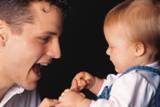|
|
Effective Parenting
Involved fathers provide practical support in raising children and serve as models for their development. Children
with involved, loving fathers are significantly more likely to do well in school,
have healthy self-esteem, exhibit empathy and pro-social behavior compared to
children who have uninvolved fathers. Committed and responsible fathering
during infancy and early childhood contributes emotional security, curiosity,
and math and verbal skills.
|
 |
|
|
Children who live with their biological fathers are, on average, at least two to
three times more likely not to be poor, less likely to use drugs, less
likely to experience educational, health, emotional and behavioral
problems, less likely to be victims of child abuse, and less likely to
engage in criminal behavior than their peers who live without their
married, biological (or adoptive) parents. These differences
are observed even after controlling for socioeconomic variables such as
race and income. |
|
The father studies increase our understanding of how fathers and mothers, in the
context of the family, influence infant and toddler development. The Early Head
Start Research and Evaluation Project assessed how programs worked with
low-income families to enhance children's development and well-being, but data
collection originally centered on mothers as the primary source of information.
The father research enables us to learn more about how programs support
fathers' relationships with their children and with the children's mother.
|
|
|
The Child Care Resource Center (ACF) has compilied a list of materials that shows
when both parents are actively and positively
involved in their children’s lives, children are more likely
to lead healthy, productive lives. Over the past several years, many
initiatives have been started to foster the positive involvement of
fathers with their children. The following resources provide a sample
of information on father involvement. The first section lists
publications that have information on research and on strategies that
relate to father involvement in the education of their children. The
second section has information on publications that have explored
father involvement in Head Start and Early Head Start programs. The
third section has general information about involvement of fathers in
the care and support of their children. The last section lists Federal
agencies and national organizations that provide resources on
fatherhood issues, including father support referrals, parenting, child custody, and research.
|
|
Fathers can have an important influence on children’s mental and
physical health. Children in two parent families are more likely to have
access to private health insurance. Children in two parent families are
likely to use more preventative and illness-related ambulatory care
than single parent families even after income and health insurance is
taken into account. Fathers warmth and closeness to their children
appears to affect health status many years later.
|
|
|
There is a growing interest the fathers and their relationship to various
child welfare issues. Historically, fathers were often overlooked by
the child welfare system when children were in the sole care of the
mother and few studies examined fathers’ involvement in child
abuse and neglect cases or the impact of family violence on children.
|
|
What are the signs or symptoms of child abuse or neglect?
Just as there are various types of abuse and neglect, the symptoms of abuse and neglect may vary from child to child.
|
|
|
Nurturing Parenting Programs
OJJDP, November 2000 (12 pages).
Child abuse and neglect are tragic realities within millions of families worldwide.
Each day children are abandoned, neglected, beaten, tortured,
mutilated, sexually molested, starved, and terrorized. Sadly, violence
toward children is not a new phenomenon; it is deeply rooted in
cultural and religious values.
PDF version
HTML version
Teenage Fatherhood and Delinquent Behavior
OJJDP, January 2000 (8 pages).
Boys who become teenage fathers are also likely to
engage in a constellation of other problem behaviors such as
noncriminal misbehavior (status offending), disruptive school behavior,
and drug use. Teenagers who engage in delinquent acts and other problem
behaviors create immediate consequences for themselves and for those
around them, but when they also father children, there may be serious
repercussions for many years to come, even for generations.
PDF version
HTML version
|
|


